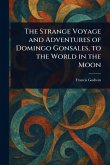Embark on a thrilling adventure with Jules Verne's "The Moon-Voyage," a cornerstone of science fiction and a testament to the enduring power of human imagination. This classic tale explores the daring concept of manned space flight, inviting readers to journey to the moon long before it became reality. Verne's visionary narrative captures the excitement and challenges of venturing into the unknown, solidifying its place as a pivotal work in the genre. Experience the wonder of early science fiction as this meticulously prepared print edition brings Verne's timeless story to life. "The Moon-Voyage" remains a captivating read for anyone fascinated by space travel, adventure, and the boundless possibilities envisioned by one of literature's greatest storytellers. A must-have for enthusiasts of classic fiction and space exploration. This work has been selected by scholars as being culturally important, and is part of the knowledge base of civilization as we know it. This work is in the public domain in the United States of America, and possibly other nations. Within the United States, you may freely copy and distribute this work, as no entity (individual or corporate) has a copyright on the body of the work. Scholars believe, and we concur, that this work is important enough to be preserved, reproduced, and made generally available to the public. We appreciate your support of the preservation process, and thank you for being an important part of keeping this knowledge alive and relevant.
Bitte wählen Sie Ihr Anliegen aus.
Rechnungen
Retourenschein anfordern
Bestellstatus
Storno









